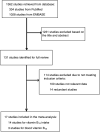A dose-response meta-analysis reveals an association between vitamin B12 and colorectal cancer risk
- PMID: 26373257
- PMCID: PMC10270965
- DOI: 10.1017/S136898001500261X
A dose-response meta-analysis reveals an association between vitamin B12 and colorectal cancer risk
Abstract
Objective: The current meta-analysis evaluated the association between vitamin B12 intake and blood vitamin B12 level and colorectal cancer (CRC) risk.
Design: The PubMed and EMBASE databases were searched. A dose-response analysis was performed with generalized least squares regression, with the relative risk (RR) and 95 % CI as effect values.
Setting: The meta-analysis included seventeen studies.
Subjects: A total of 10 601 patients.
Results: The non-linear dose-response relationship between total vitamin B12 intake and CRC risk was insignificant (P=0·690), but the relationship between dietary vitamin B12 intake and CRC risk was significant (P<0·001). Every 4·5 μg/d increment in total and dietary vitamin B12 intake was inversely associated with CRC risk (total intake: RR=0·963; 95 % CI 0·928, 0·999; dietary intake: RR=0·914; 95 % CI 0·856, 0·977). The inverse association between vitamin B12 intake and CRC risk was also significant when vitamin B12 intake was over a dosage threshold, enhancing the non-linear relationship. The non-linear dose-response relationship between blood vitamin B12 level and CRC risk was insignificant (P=0·219). There was an insignificant association between every 150 pmol/l increment in blood vitamin B12 level and CRC risk (RR=1·023; 95 % CI 0·881, 1·187).
Conclusions: Our meta-analysis indicates that evidence supports the use of vitamin B12 for cancer prevention, especially among populations with high-dose vitamin B12 intake, and that the association between CRC risk and total vitamin B12 intake is stronger than between CRC risk and dietary vitamin B12 intake only.
Keywords: Colorectal cancer; Meta-analysis; Vitamin B12.
Figures





Similar articles
-
Dietary intake of vitamin B12 in relation to diet and lifestyle characteristics in a population at high risk for colorectal cancer.Cent Eur J Public Health. 2018 Dec;26(4):253-259. doi: 10.21101/cejph.a4585. Cent Eur J Public Health. 2018. PMID: 30660133
-
Vitamin B2 intake reduces the risk for colorectal cancer: a dose-response analysis.Eur J Nutr. 2019 Jun;58(4):1591-1602. doi: 10.1007/s00394-018-1702-5. Epub 2018 May 9. Eur J Nutr. 2019. PMID: 29744609
-
Additively protective effects of vitamin D and calcium against colorectal adenoma incidence, malignant transformation and progression: A systematic review and meta-analysis.Clin Nutr. 2020 Aug;39(8):2525-2538. doi: 10.1016/j.clnu.2019.11.012. Epub 2019 Nov 16. Clin Nutr. 2020. PMID: 31784301
-
Dietary sources of iron and vitamin B12: Is this the missing link in colorectal carcinogenesis?Med Hypotheses. 2018 Jul;116:105-110. doi: 10.1016/j.mehy.2018.05.003. Epub 2018 May 8. Med Hypotheses. 2018. PMID: 29857891
-
Association of vitamin B6, vitamin B12 and methionine with risk of breast cancer: a dose-response meta-analysis.Br J Cancer. 2013 Oct 1;109(7):1926-44. doi: 10.1038/bjc.2013.438. Epub 2013 Aug 1. Br J Cancer. 2013. PMID: 23907430 Free PMC article.
Cited by
-
Is There a Carcinogenic Risk Attached to Vitamin B12 Deficient Diets and What Should We Do About It? Reviewing the Facts.Mol Nutr Food Res. 2021 Mar;65(6):e2000945. doi: 10.1002/mnfr.202000945. Epub 2021 Feb 19. Mol Nutr Food Res. 2021. PMID: 33548097 Free PMC article. Review.
-
Periodontal Disease and Tooth Loss Are Associated with Lung Cancer Risk.Biomed Res Int. 2020 Jul 27;2020:5107696. doi: 10.1155/2020/5107696. eCollection 2020. Biomed Res Int. 2020. PMID: 32802852 Free PMC article.
-
Association between nutrient intake related to the one-carbon metabolism and colorectal cancer risk: a case-control study in the Basque Country.Eur J Nutr. 2023 Dec;62(8):3181-3191. doi: 10.1007/s00394-023-03229-2. Epub 2023 Aug 6. Eur J Nutr. 2023. PMID: 37543963 Free PMC article.
-
A probiotic Limosilactobacillus fermentum GR-3 mitigates colitis-associated tumorigenesis in mice via modulating gut microbiome.NPJ Sci Food. 2024 Sep 6;8(1):61. doi: 10.1038/s41538-024-00307-5. NPJ Sci Food. 2024. PMID: 39242568 Free PMC article.
-
Methyl-Donors Can Induce Apoptosis and Attenuate Both the Akt and the Erk1/2 Mediated Proliferation Pathways in Breast and Lung Cancer Cell Lines.Int J Mol Sci. 2021 Mar 30;22(7):3598. doi: 10.3390/ijms22073598. Int J Mol Sci. 2021. PMID: 33808426 Free PMC article.
References
-
- Jemal A, Bray F, Center MM et al.. (2011) Global cancer statistics. CA Cancer J Clin 61, 69–90. - PubMed
-
- Potter JD (1999) Colorectal cancer: molecules and populations. J Natl Cancer Inst 91, 916–932. - PubMed
-
- Cunningham C & Dunlop MG (1996) Molecular genetic basis of colorectal cancer susceptibility. Br J Surg 83, 321–329. - PubMed
-
- Hill MJ (1998) Gene–environment interactions in the pathogenesis of colorectal cancer. Eur J Cancer Prev 7, 351–352. - PubMed
-
- Steinmetz KA & Potter JD (1996) Vegetables, fruit, and cancer prevention: a review. J Am Diet Assoc 96, 1027–1039. - PubMed
Publication types
MeSH terms
Substances
LinkOut - more resources
Full Text Sources
Medical

